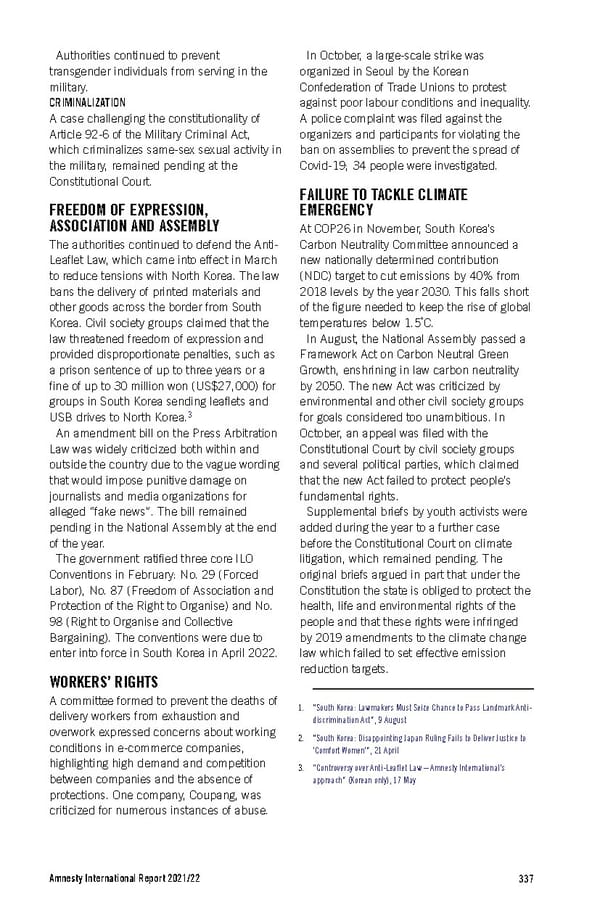Authorities continued to prevent In October, a large-scale strike was transgender individuals from serving in the organized in Seoul by the Korean military. Confederation of Trade Unions to protest CRIMINALIZATION against poor labour conditions and inequality. A case challenging the constitutionality of A police complaint was filed against the Article 92-6 of the Military Criminal Act, organizers and participants for violating the which criminalizes same-sex sexual activity in ban on assemblies to prevent the spread of the military, remained pending at the Covid-19; 34 people were investigated. Constitutional Court. FAILURE TO TACKLE CLIMATE FREEDOM OF EXPRESSION, EMERGENCY ASSOCIATION AND ASSEMBLY At COP26 in November, South Korea’s The authorities continued to defend the Anti- Carbon Neutrality Committee announced a Leaflet Law, which came into effect in March new nationally determined contribution to reduce tensions with North Korea. The law (NDC) target to cut emissions by 40% from bans the delivery of printed materials and 2018 levels by the year 2030. This falls short other goods across the border from South of the figure needed to keep the rise of global Korea. Civil society groups claimed that the temperatures below 1.5˚C. law threatened freedom of expression and In August, the National Assembly passed a provided disproportionate penalties, such as Framework Act on Carbon Neutral Green a prison sentence of up to three years or a Growth, enshrining in law carbon neutrality fine of up to 30 million won (US$27,000) for by 2050. The new Act was criticized by groups in South Korea sending leaflets and environmental and other civil society groups USB drives to North Korea.3 for goals considered too unambitious. In An amendment bill on the Press Arbitration October, an appeal was filed with the Law was widely criticized both within and Constitutional Court by civil society groups outside the country due to the vague wording and several political parties, which claimed that would impose punitive damage on that the new Act failed to protect people’s journalists and media organizations for fundamental rights. alleged “fake news”. The bill remained Supplemental briefs by youth activists were pending in the National Assembly at the end added during the year to a further case of the year. before the Constitutional Court on climate The government ratified three core ILO litigation, which remained pending. The Conventions in February: No. 29 (Forced original briefs argued in part that under the Labor), No. 87 (Freedom of Association and Constitution the state is obliged to protect the Protection of the Right to Organise) and No. health, life and environmental rights of the 98 (Right to Organise and Collective people and that these rights were infringed Bargaining). The conventions were due to by 2019 amendments to the climate change enter into force in South Korea in April 2022. law which failed to set effective emission reduction targets. WORKERS’ RIGHTS A committee formed to prevent the deaths of 1. “South Korea: Lawmakers Must Seize Chance to Pass Landmark Anti- delivery workers from exhaustion and discrimination Act”, 9 August overwork expressed concerns about working 2. “South Korea: Disappointing Japan Ruling Fails to Deliver Justice to conditions in e-commerce companies, ‘Comfort Women’”, 21 April highlighting high demand and competition 3. “Controversy over Anti-Leaflet Law – Amnesty International’s between companies and the absence of approach” (Korean only), 17 May protections. One company, Coupang, was criticized for numerous instances of abuse. Amnesty International Report 2021/22 337
 Amnesty International Report 2021/22 Page 336 Page 338
Amnesty International Report 2021/22 Page 336 Page 338